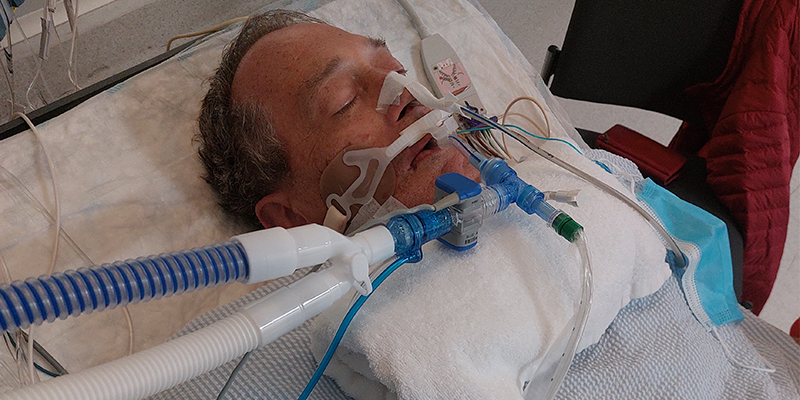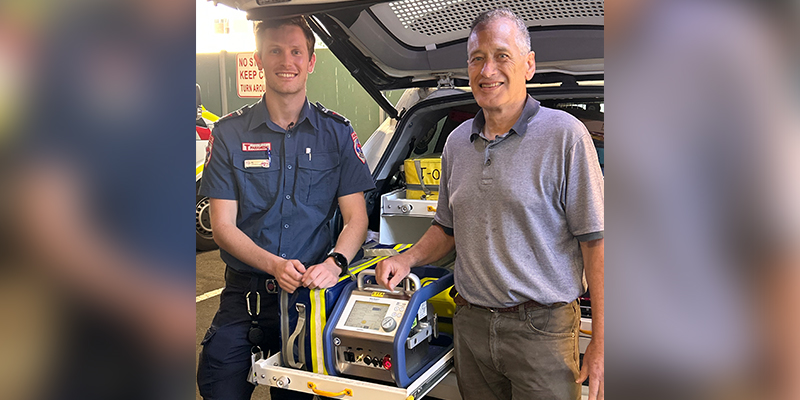World-leading medical technology being trialed by Ambulance Victoria (AV) and The Alfred has helped save a Hawthorn man's life.
Three months ago, Hugh Burrill was completing his regular gym class when he collapsed without warning.
His wife, Meridee, a general practitioner who was also in the class, knew straight away he was in cardiac arrest and started cardiopulmonary resuscitation (CPR).
With the help of bystanders and an automated external defibrillator (AED), Hugh's heart started beating again.
However, the relief was short lived as Hugh went into cardiac arrest for a second time not long after paramedics arrived.
 Hugh while he was in ICU at The Alfred.
Hugh while he was in ICU at The Alfred.
Hugh was then treated with a complex portable heart-lung machine, known as extra-corporeal membrane oxygenation (ECMO).
The ECMO machine allows blood to be pumped outside the body, removing carbon dioxide and sending oxygen-filled blood back to the body.
A responding AV Mobile Intensive Care Ambulance (MICA) paramedic was joined by intensive care specialists from Alfred Health who brought the ECMO technology to the scene.
Hugh said without ECMO and the work of paramedics and intensive care specialists, he would not have survived.
 AV Paramedic Alastair Miller was one of the first on scene to assist Hugh Burrill after he had a cardiac arrest in October
AV Paramedic Alastair Miller was one of the first on scene to assist Hugh Burrill after he had a cardiac arrest in October
which resulted in him receiving pre-hospital ECMO treatment.
"I am incredibly fortunate that they happen to be running the clinical trial and that I met the criteria for ECMO," he said.
An incredible team effort by Meridee, his gym trainer and classmates, AV paramedics and intensive care specialists from The Alfred ensured Hugh's survival.
AV Medical Director Associate Professor David Anderson said Melbourne was one of just a handful of cities around the world that are delivering pre-hospital ECMO.
"Hugh was fortunate to be part of a feasibility study that brings cutting-edge technology from the hospital to the scene," he said.
"ECMO ensures patients can get the potentially lifesaving treatment they need faster, potentially improving their chance of survival.
"Victoria is home to some of best medical specialists in the world, which allows us to utilise advanced medical equipment like ECMO and deliver ground-breaking research.
"Hugh's story is also a great reminder that bystanders can play an active role in helping someone in cardiac arrest."
AV and The Alfred recently completed a feasibility study for ECMO, which Hugh was part of, to determine whether the technology is practical and effective in Victoria - the research is also known as CHEER3.
Since the trial commenced, 15 patients have been treated using ECMO.
Trial co-lead and intensive care specialist at The Alfred Dr Sacha Richardson said his team had been using ECMO in the hospital-setting for years, but technological advancement meant the machines were now small enough to take to the streets.
"CPR and defibrillation are still the mainstay of cardiac arrest response, but a person's chance of survival falls to less than five per cent if you can't restart their heart within 30 minutes," Dr Richardson said.
"The Alfred is the only designated Platinum Level Centre of Excellence for ECMO in Australia - and one of few hospitals in the world - and we are proud to be partnering with Ambulance Victoria on this important trial initiative for our community."






